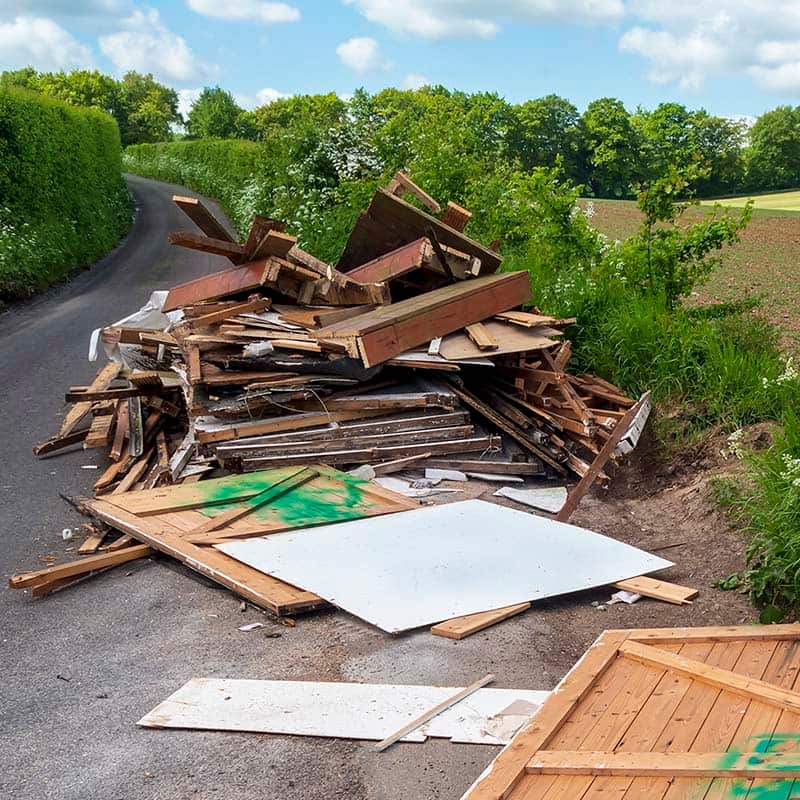
Effective enforcement: deterring litterers and flytippers
Enforcement plays an important role in litter prevention, alongside education, communications and infrastructure.
But how can you make your enforcement strategy as effective as possible?
Use this guide to help identify and tackle the key challenges you face in litter and flytipping enforcement. There are materials you can start using right now, along with some examples of current best practice.
This guide is not about the detailed process of enforcement: you know how to do that. It’s designed instead to help you find ways of maximising the impact of your enforcement policy and its deterrent effect.
Understand the context

North Lanarkshire Council has found the most effective communications around enforcement begin with understanding the context. The enforcement team spend time speaking to the communities they help: attending tenants’ meetings and local neighbourhood groups to gather as much information about litter and flytipping hotspots as possible.
Then the team targets their response. Instead of putting up posters everywhere, they choose specific streets that experience specific problems – whether that’s dog fouling, littering or flytipping. And when they take action and issue fixed penalty notices, they let the community know. That way, everyone sees that the local authority takes these problems seriously, and is taking action against the offenders.
Start with our partner guide...
Our partner guide for enforcement is an excellent place to begin. It contains lots of material you can use to highlight the fixed penalties for littering and flytipping. It’s full of key messages and useful statistics – backed up with template articles for media releases. You’ll also find ideas for your social media activity, as well as useful websites and other publications.
You can use the partner guide to communicate with the general public, your staff, elected members and other stakeholders.
ZWS1073 Litter Strategy (SG) guidance amended FINAL (1).pdf
Spread the word: enforcement works
Enforcement isn’t about recouping costs through fines, though the revenue generated by fixed penalties can offset the costs of clearing up. Enforcement is about showing that littering and flytipping are socially unacceptable, and that they can carry a significant financial penalty. Issuing and enforcing fines shows that you take the problem seriously, and that you’re serious about tackling it.


Fines: it’s not the money, it’s the message
Communicating about enforcement is just as important as the enforcement work itself. Zero Waste Scotland has produced two toolkits, covering litter and flytipping prevention, which complement the enforcement guide. Both Toolkits are full of resources you can use to get the message out – with plenty of communications based on the fines that people can expect if they break the law.
Zero-tolerance in Doncaster
Enforcement works best when it’s clear and consistent. A zero-tolerance approach means that everyone is treated fairly, and it sends a distinct message.
Doncaster Metropolitan Council’s zero-tolerance policy has led to a dramatic improvement in some of the town’s busiest areas. Their Environmental Crime team oversees the city’s enforcement policies. In 2016 the council issued 8,500 fixed penalty notices for littering and dog fouling – and the council pursues around 2,000 flytipping investigations a year.
Lessons learned – city centre enforcement officers:
- Make them obvious – you don’t have to sneak around, is the message from Doncaster. Sometimes it’s important to get your enforcement officers in uniform, and label them ‘litter patrol’. That way, people know what to expect if they drop litter.
- It takes time for the message to get through – the results aren’t immediate, but people do catch on that if you drop litter and you’re caught, you get a fine.
- Get the local press on your side – The Doncaster team developed a close relationship with the local paper and get lots of publicity for their initiatives, and for successful prosecutions. If the press isn’t on your side yet, convince them to send a reporter along, to see the team at work first-hand. You can use the media release templates in the National Litter Strategy Partner Guide to get the message out.
- Get people talking about it – communicate as widely as you can about the successes of your enforcement policy. Engage with your communities wherever they are – from social media to the Scout hall.


In focus: how Hexthorpe used landlords to get through to short-term tenants
How do you create lasting change in an area where most people are short-term renters? Doncaster Council switched the focus from tenant to landlord to tackle the problem. The project has recorded good results – and it won an award from Keep Britain Tidy.
When your audience changes every quarter
Hexthorpe has a transient population: most people rent, and people stay in one place for only three to four months on average. The whole area suffers badly from littering and flytipping. And because the audience is always changing, the usual channels of communication and enforcement just weren’t working.
Speak to the landlords instead
The council used selective licensing to give landlords the responsibility for showing new tenants how to dispose of their waste as soon as they move in.
Landlords now also have to make sure the right waste and recycling facilities are in place – providing bins and clear information about collections.
The result? After the first year of the scheme, there was a 20% reduction in reports of untidy properties, and a significant reduction in flytipping investigations.
Create neighbourhood pressure against offenders — Coventry City Council
Litter and flytipping behaviour is influenced by social norms. If an area is already littered, or if there’s a pile of flytipped waste in a communal garden, people are more likely to add to it. They assume nobody cares.
So how can you inspire a sense that the neighbourhood is watching – and that the community does care about the environment? Coventry City Council has used a simple system of notice cards to increase positive peer pressure among residents. They have empowered their wardens to:
- Label the waste – wardens leave a notice card that warns the property owner of potential fines and recommends disposal methods. The card also contains a QR code which other people can scan with their phones and report any information. The council hopes attention from neighbours will make the culprit feel ‘named and shamed’, pressuring them to take action.
- Appeal for witnesses – wardens post witness request cards into neighbouring properties. The testimonies can then be used in court – if things go that far.
If the waste stays put, the council cleans it up and recoups the costs in court.
Make the whole block liable
Witness cards work for individual houses, but what about flytipped waste outside apartment blocks? Simple: either one person owns up, or the whole block is issued with a fixed penalty. It’s a simple, effective way to use social pressure to get results.
Incidents dropped from 17 to 4
The cards have had a promising effect. The average number of incidents of flytipped materials found by wardens on each monitoring trip has dropped from 17 to 4. The main reason for success, says the council, has been to get neighbours to pressure other neighbours. It is the peer pressure that delivers the results.


Taking matters further
One of the key challenges facing local authorities is dealing with non-payment of fines. Given the pressures on Scottish courts there is no simple solution but evidence suggests that any cases referred to the Crown Office and Procurator Fiscal Service (COPFS) will have the best chance of success where there is sufficient evidence to support a successful prosecution.
Build relationships, gather evidence
Local authorities could consider a closer working relationship with COPFS to improve their understanding of evidence requirements, and Police Scotland for assistance with offenders who are difficult to deal with. This could result in efficiencies for the authority and COPFS in not having to process cases that cannot satisfy the evidence requirements.
Name and shame: Sheffield City Council names bad offenders online
When people refuse to pay a fixed penalty notice, councils can take them to court. Sheffield City Council goes one step further, and publishes the names and addresses of those who were successfully prosecuted online – as well as details of the fines.
It’s a stark message, and an eye-grabbing approach. It shows everyone that Sheffield City Council takes littering and flytipping extremely seriously. Getting shamed online for the offence, and for refusing to pay the initial fine, is an added deterrent.
This approach has also been tried in Scotland, though we would recommend that any Scottish Local Authority considering publishing details of offenders should first check this with their legal department.


In focus: fines and community service in Glasgow
Glasgow takes a strict approach to litter prevention: if you’re caught littering, you get a fine. Community Safety Glasgow leads this zero-tolerance approach with a team of officers who patrol across the city. The officers issue around 1,000 fixed penalty notices a month – they also operate mobile CCTV vans as a deterrent to anti-social behaviour.
Deterrents for minors
Deliberate littering results in an automatic £80 fine – which people can pay online or over the phone, all at once or in £5 instalments.
But fining a minor often leads to situations where the parents pay the fine, if it is paid at all, and the kids don’t necessarily soak up the consequence.
For young people aged under 16, Community Safety Glasgow introduced another option: three hours of community litter picking, instead of the £80 fine. They’ve since extended this option to adult residents who can’t afford to pay the fine.
Oblitterate: tackling lunchtime litter in school
North Ayrshire Council has piloted a radical approach to tackling lunchtime litter around Auchenharvie Academy. The new scheme mixes enforcement – detentions, litter picks, and referrals to the antisocial behaviour team – with incentives to reward good behaviour.
The council estimates that cleaning up lunchtime litter costs £35,000 a year per school. It’s one of the biggest problems the council faces – and top of the list for their enforcement team.
Detentions, litter picks, and referrals for antisocial behaviour
The team members were keen to have a bigger impact than the normal approach of talks at lunchtime, and designed an intervention based on enforcement. Highly visible officers patrol the school and surrounding area at lunchtime, and give out detentions to any students found littering. For a second offence, they’re drafted onto a litter pick – and a letter is sent to their parents. Repeated offenders are referred to the antisocial behaviour team.
The scheme doesn’t just punish litterers – it also encourages positive behaviour by rewarding students who use the bins with activity passes for the local sports centre. Students were encouraged to share litter bin selfies on Twitter and Facebook to win activity passes too.
The results have been extremely positive. Anecdotally, the teachers at Auchenharvie have noticed a marked reduction in litter in and around the school, and other schools in the area have asked to run similar schemes.
Lessons learned:
- Lunchtime litter-prevention talks don’t work – ‘you can see their eyes glaze over,’ says the enforcement team
- Don’t copy, design – mimicking other interventions won’t necessarily get you results: look at the problem, identify the causes, and address them according to the context
- Pupils take notice when you take their time – enforcement in a school context works best when it revolves around time penalties, not money. Options might include detentions and litter picks.

Three takeouts
Talk to people, tell them what you’re doing
Communication is the way to make enforcement work as hard as possible. Whether you’re gathering information from local groups, advertising the fixed penalty notices issued for littering and flytipping, or reporting your results and prosecutions – make sure your message gets out there.
Social pressure works
Making littering and flytipping socially unacceptable is the primary aim of enforcement. Create social pressure by labelling flytipped waste, asking for witnesses to come forward, or even just encouraging more activity on social media. If you can get people talking about getting an £80 fine for dropping a cigarette butt, you’re halfway there.
Different approaches for different contexts
An £80 fixed penalty notice can work for litter prevention among adults, but enforcement is a less straightforward route for under 16s, and other deterrents should also be considered. In all circumstances, think about your audience and the context of their littering behaviour — and design your enforcement policies accordingly. Bear in mind that infrastructure, education and awareness are all part of the mix.







